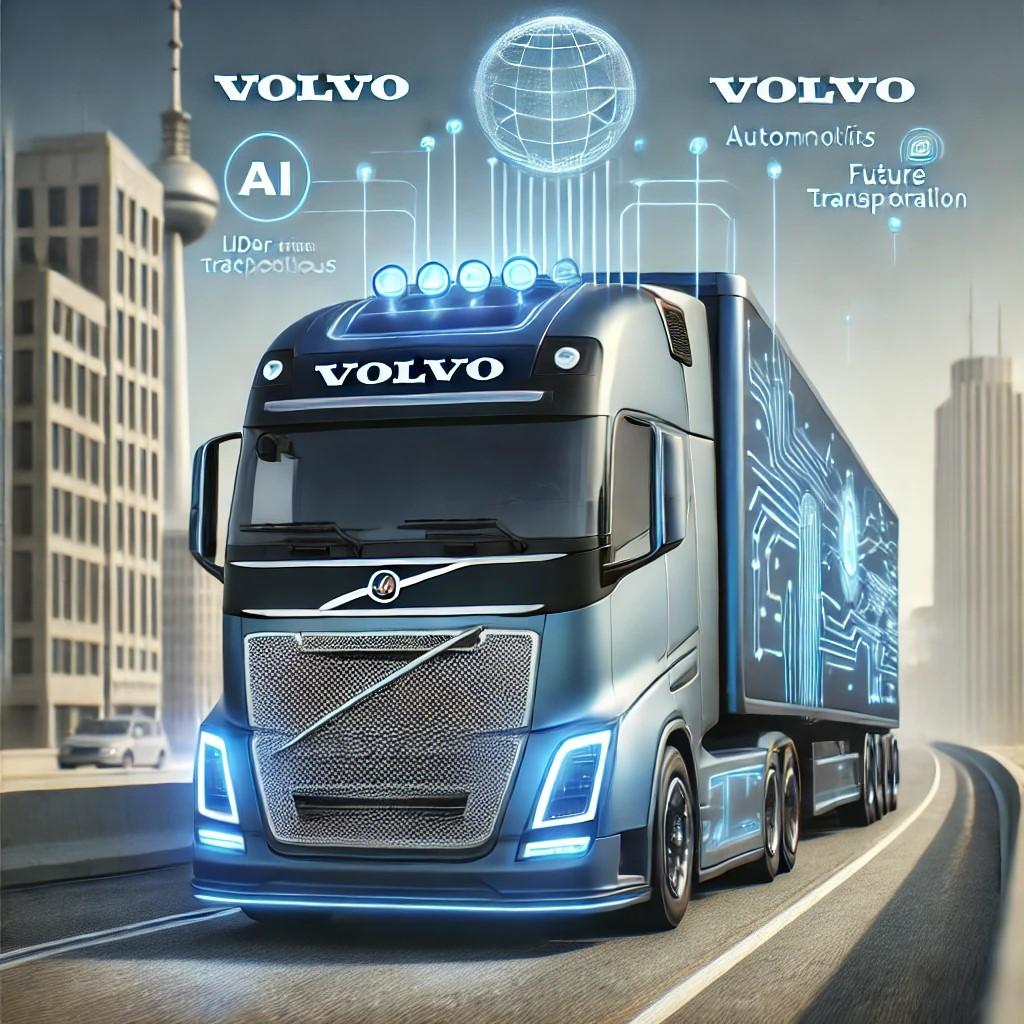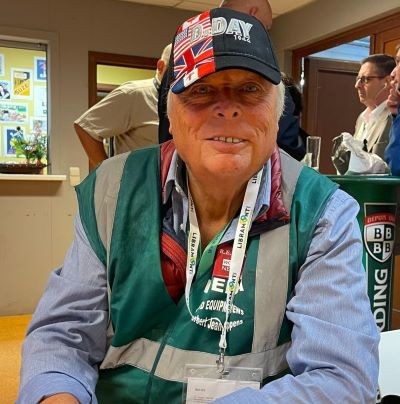R.E.News future Technology-Volvo and Start-up Waabi Driving Autonomous Trucking into the Future
 10/02/25-FR-English-NL-footer
10/02/25-FR-English-NL-footer
Volvo et la start-up Waabi propulsent le camionnage autonome vers l'avenir
 Image-R.E.News
Image-R.E.News
Volvo Autonomous Solutions (VAS) a annoncé un partenariat stratégique avec la start-up canadienne d'intelligence artificielle Waabi Innovation Inc., qui fait un grand pas en avant vers l'avenir du transport de marchandises.
Cette collaboration vise à développer et à déployer des camions autonomes, avec des projets de tests prévus plus tard cette année.
L'unité Autonomous Solutions de Volvo se prépare à produire un nombre limité de camions grâce à ce partenariat dans son usine d'assemblage de New River Valley à Dublin, en Virginie. Ces camions Volvo VNL Autonomous prêts à la production seront équipés de la technologie de conduite autonome de pointe de Waabi, marquant un moment charnière dans l'intégration de l'IA dans les véhicules lourds.
Raquel Urtasun, PDG de Waabi, a souligné l'importance de telles collaborations, déclarant : « Il est très important d'avoir un partenariat de mise sur le marché. » Ce sentiment souligne la nécessité de combiner les expertises pour concrétiser les solutions autonomes.
Après les phases de test initiales, le partenariat vise à déployer ces camions autonomes dans le cadre de programmes pilotes. Ces initiatives sont conçues pour évaluer rigoureusement les performances et la sécurité des véhicules dans des conditions réelles, en s’assurant qu’ils répondent aux normes élevées requises pour les opérations commerciales.
L’intégration du système de conducteur virtuel de Waabi dans le Volvo VNL Autonomous témoigne des avancées de l’IA et de l’apprentissage automatique. Ce système utilise un simulateur numérique, Waabi World, pour former, tester et valider ses capacités, ce qui permet un développement et un perfectionnement rapides.
L’industrie du camionnage est depuis longtemps confrontée à des défis tels que la pénurie de chauffeurs et la nécessité d’accroître l’efficacité opérationnelle. En adoptant la technologie autonome, des entreprises comme Volvo et Waabi sont prêtes à proposer des solutions qui non seulement atténuent ces problèmes, mais améliorent également la sécurité et la productivité.
De plus, l’évolution vers les camions autonomes s’aligne sur les tendances plus larges du secteur des transports, où l’accent est de plus en plus mis sur l’exploitation de la technologie pour créer des réseaux logistiques plus durables et plus efficaces.
Investissements stratégiques et perspectives d’avenir
L’investissement de Volvo dans Waabi en 2023 a jeté les bases de ce partenariat, soulignant l’engagement de l’entreprise en faveur de l’innovation dans le domaine du transport autonome. Cette collaboration n’est pas exclusive, Waabi ayant exprimé son intention d’intégrer sa technologie à celle d’autres fabricants à l’avenir, signalant une vision plus large de l’application de leurs systèmes d’IA.
Urtasun a également fait allusion à la polyvalence de la technologie de Waabi, suggérant des applications potentielles au-delà du camionnage, notamment les robotaxis et les robots humanoïdes. Cette adaptabilité pourrait ouvrir de nouvelles voies dans divers secteurs, mettant davantage en évidence le potentiel de transformation des systèmes d’IA avancés.
Le partenariat entre Volvo et Waabi est une étape importante vers la réalisation de la vision du transport de marchandises autonome. En combinant l’expertise de Volvo dans la fabrication de véhicules avec la technologie d’IA de pointe de Waabi, la collaboration vise à fournir des solutions autonomes sûres et efficaces qui peuvent révolutionner le secteur de la logistique.
Au fur et à mesure que le développement progresse, les parties prenantes des secteurs du transport et de la logistique observeront attentivement les résultats des programmes pilotes. Un déploiement réussi pourrait ouvrir la voie à une adoption plus large des camions autonomes, remodelant les chaînes d'approvisionnement et établissant de nouvelles normes d'efficacité et de sécurité dans le transport de marchandises.
La collaboration entre Volvo et Waabi représente une approche avant-gardiste pour relever les défis actuels du secteur du transport routier. En tirant parti de l'IA avancée et des technologies autonomes, ils améliorent non seulement l'efficacité opérationnelle, mais ouvrent également la voie à un avenir plus sûr et plus durable dans le transport de marchandises.
Alors que ces camions autonomes commencent à prendre la route, l'industrie se rapproche d'une nouvelle ère où la technologie et l'innovation stimulent le progrès, offrant des solutions prometteuses à des défis de longue date.
NJC.© Info Waabi Innovation Inc.
------------------------------------------------------------------------------------------------------------------
 10/02/25-English
10/02/25-English
Volvo and Start-up Waabi Driving Autonomous Trucking into the Future
 Image-R.E.News
Image-R.E.News
In a significant leap towards the future of freight transport, Volvo Autonomous Solutions (VAS) has announced a strategic partnership with Canadian artificial intelligence start-up Waabi Innovation Inc.
This collaboration aims to develop and deploy autonomous trucks, with plans to commence testing later this year.
Volvo’s Autonomous Solutions unit is gearing up to produce a limited number of trucks through this partnership at their New River Valley assembly plant in Dublin, Virginia. These production-ready Volvo VNL Autonomous trucks will be equipped with Waabi’s state-of-the-art self-driving technology, marking a pivotal moment in the integration of AI into heavy-duty vehicles.
Raquel Urtasun, CEO of Waabi, emphasized the importance of such collaborations, stating: “It’s very important to have a go-to-market partnership.” This sentiment underscores the necessity of combining expertise to bring autonomous solutions to fruition.
Following initial testing phases, the partnership aims to deploy these autonomous trucks through pilot programs. These initiatives are designed to rigorously assess the performance and safety of the vehicles in real-world conditions, ensuring they meet the high standards required for commercial operations.
The integration of Waabi’s virtual driver system into the Volvo VNL Autonomous is a testament to the advancements in AI and machine learning. This system utilizes a digital simulator, Waabi World, to train, test, and validate its capabilities, allowing for rapid development and refinement.
The trucking industry has long grappled with challenges such as driver shortages and the need for increased operational efficiency. By embracing autonomous technology, companies like Volvo and Waabi are poised to offer solutions that not only mitigate these issues but also enhance safety and productivity.
Moreover, the move towards autonomous trucks aligns with broader trends in the transportation sector, where there’s a growing emphasis on leveraging technology to create more sustainable and efficient logistics networks.
Strategic Investments and Future Prospects
Volvo’s investment in Waabi in 2023 laid the foundation for this partnership, highlighting the company’s commitment to innovation in autonomous transportation. This collaboration is not exclusive, with Waabi expressing intentions to integrate its technology with other manufacturers in the future, signalling a broader vision for the application of their AI systems.
Urtasun also hinted at the versatility of Waabi’s technology, suggesting potential applications beyond trucking, including robotaxis and humanoid robots. This adaptability could open new avenues in various sectors, further showcasing the transformative potential of advanced AI systems.
The partnership between Volvo and Waabi is a significant step towards realizing the vision of autonomous freight transport. By combining Volvo’s expertise in vehicle manufacturing with Waabi’s cutting-edge AI technology, the collaboration aims to deliver safe and efficient autonomous solutions that can revolutionize the logistics industry.
As the development progresses, stakeholders across the transportation and logistics sectors will be keenly observing the outcomes of the pilot programs. Successful deployment could pave the way for broader adoption of autonomous trucks, reshaping supply chains and setting new standards for efficiency and safety in freight transport.
The collaboration between Volvo and Waabi represents a forward-thinking approach to addressing current challenges in the trucking industry. By leveraging advanced AI and autonomous technologies, they are not only enhancing operational efficiency but also setting the stage for a safer and more sustainable future in freight transportation.
As these autonomous trucks begin to hit the roads, the industry moves closer to a new era where technology and innovation drive progress, offering promising solutions to longstanding challenges.
NJC.© Info Waabi Innovation Inc.
-------------------------------------------------------------------------------------------------------------------
 10/02/25-NL
10/02/25-NL
Volvo en start-up Waabi brengen autonome vrachtwagens naar de toekomst
 Image-R.E.News
Image-R.E.News
In een belangrijke stap richting de toekomst van goederenvervoer heeft Volvo Autonomous Solutions (VAS) een strategisch partnerschap aangekondigd met de Canadese start-up Waabi Innovation Inc. voor kunstmatige intelligentie.
Deze samenwerking is gericht op de ontwikkeling en inzet van autonome vrachtwagens, met plannen om later dit jaar met testen te beginnen.
De Autonomous Solutions-eenheid van Volvo bereidt zich voor om een beperkt aantal vrachtwagens te produceren via dit partnerschap in hun assemblagefabriek in New River Valley in Dublin, Virginia. Deze productieklare Volvo VNL autonome vrachtwagens worden uitgerust met Waabi's geavanceerde zelfrijdende technologie, wat een cruciaal moment markeert in de integratie van AI in zware voertuigen.
Raquel Urtasun, CEO van Waabi, benadrukte het belang van dergelijke samenwerkingen en zei: "Het is erg belangrijk om een go-to-market-partnerschap te hebben." Dit sentiment onderstreept de noodzaak om expertise te combineren om autonome oplossingen tot bloei te brengen.
Na de eerste testfases wil het partnerschap deze autonome vrachtwagens inzetten via pilotprogramma's. Deze initiatieven zijn ontworpen om de prestaties en veiligheid van de voertuigen in realistische omstandigheden nauwkeurig te beoordelen, zodat ze voldoen aan de hoge normen die vereist zijn voor commerciële activiteiten.
De integratie van Waabi's virtuele bestuurderssysteem in de Volvo VNL Autonomous is een bewijs van de vooruitgang in AI en machine learning. Dit systeem maakt gebruik van een digitale simulator, Waabi World, om zijn mogelijkheden te trainen, testen en valideren, wat snelle ontwikkeling en verfijning mogelijk maakt.
De vrachtwagenindustrie worstelt al lang met uitdagingen zoals een tekort aan chauffeurs en de behoefte aan verhoogde operationele efficiëntie. Door autonome technologie te omarmen, zijn bedrijven als Volvo en Waabi klaar om oplossingen te bieden die niet alleen deze problemen verminderen, maar ook de veiligheid en productiviteit verbeteren.
Bovendien sluit de overstap naar autonome vrachtwagens aan bij bredere trends in de transportsector, waar steeds meer nadruk wordt gelegd op het benutten van technologie om duurzamere en efficiëntere logistieke netwerken te creëren. Strategische investeringen en toekomstige vooruitzichten
De investering van Volvo in Waabi in 2023 legde de basis voor dit partnerschap en benadrukte de toewijding van het bedrijf aan innovatie in autonoom transport. Deze samenwerking is niet exclusief, aangezien Waabi de intentie uitsprak om zijn technologie in de toekomst te integreren met andere fabrikanten, wat duidt op een bredere visie voor de toepassing van hun AI-systemen.
Urtasun hintte ook op de veelzijdigheid van Waabi's technologie en suggereerde mogelijke toepassingen buiten het vrachtvervoer, waaronder robotaxi's en humanoïde robots. Deze aanpasbaarheid zou nieuwe wegen kunnen openen in verschillende sectoren, wat het transformatieve potentieel van geavanceerde AI-systemen verder laat zien.
Het partnerschap tussen Volvo en Waabi is een belangrijke stap in de richting van het realiseren van de visie van autonoom vrachtvervoer. Door de expertise van Volvo in voertuigproductie te combineren met de geavanceerde AI-technologie van Waabi, streeft de samenwerking ernaar om veilige en efficiënte autonome oplossingen te leveren die de logistieke sector kunnen revolutioneren.
Naarmate de ontwikkeling vordert, zullen belanghebbenden in de transport- en logistieke sectoren de resultaten van de pilotprogramma's nauwlettend in de gaten houden. Succesvolle implementatie zou de weg kunnen vrijmaken voor bredere acceptatie van autonome vrachtwagens, het hervormen van toeleveringsketens en het stellen van nieuwe normen voor efficiëntie en veiligheid in goederenvervoer.
De samenwerking tussen Volvo en Waabi vertegenwoordigt een vooruitstrevende aanpak om de huidige uitdagingen in de vrachtwagenindustrie aan te pakken. Door geavanceerde AI en autonome technologieën te benutten, verbeteren ze niet alleen de operationele efficiëntie, maar leggen ze ook de basis voor een veiligere en duurzamere toekomst in goederenvervoer.
Nu deze autonome vrachtwagens de weg op gaan, komt de industrie dichter bij een nieuw tijdperk waarin technologie en innovatie de vooruitgang stimuleren en veelbelovende oplossingen bieden voor langdurige uitdagingen.
NJC.© Info Waabi Innovation Inc.
--------------------------------------------------------------------------------------------------------------
Date de dernière mise à jour : 07/02/2025
















